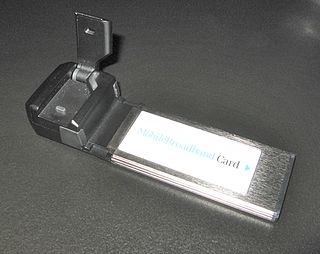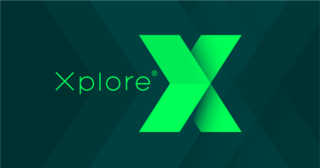
Wireless broadband is a telecommunications technology that provides high-speed wireless Internet access or computer networking access over a wide area. The term encompasses both fixed and mobile broadband.
Telecommunications in Uruguay includes radio, television, telephones, and the Internet.

Bell Canada is a Canadian telecommunications company headquartered at 1 Carrefour Alexander-Graham-Bell in the borough of Verdun, Quebec, in Canada. It is an ILEC in the provinces of Ontario and Quebec; as such, it was a founding member of the Stentor Alliance. It is also a CLEC for enterprise customers in the western provinces.

Bell Internet, originally and frequently still called Sympatico, is the residential Internet service provider (ISP) division of BCE Inc. As of May 3, 2012, Bell Internet had over 3 million subscribers in Ontario and Quebec, making it the largest ISP in Canada.

Internet access is a facility or service that provides connectivity for a computer, a computer network, or other network device to the Internet, and for individuals or organizations to access or use applications such as email and the World Wide Web. Internet access is offered for sale by an international hierarchy of Internet service providers (ISPs) using various networking technologies. At the retail level, many organizations, including municipal entities, also provide cost-free access to the general public.

A wireless Internet service provider (WISP) is an Internet service provider with a network based on wireless networking. Technology may include commonplace Wi-Fi wireless mesh networking, or proprietary equipment designed to operate over open 900 MHz, 2.4 GHz, 4.9, 5, 24, and 60 GHz bands or licensed frequencies in the UHF band, LMDS, and other bands from 6 GHz to 80 GHz.
Rogers Hi-Speed Internet is a broadband Internet service provider in Canada, owned by Rogers Communications. Rogers previously operated under the brand names Rogers@Home, Rogers Yahoo! Hi-Speed Internet, WAVE, and Road Runner in Newfoundland. It is currently the second largest Internet provider in Canada, after Bell Internet by customer count.

Worldwide Interoperability for Microwave Access (WiMAX) is a family of wireless broadband communication standards based on the IEEE 802.16 set of standards, which provide physical layer (PHY) and media access control (MAC) options.
A leased line is a private telecommunications circuit between two or more locations provided according to a commercial contract. It is sometimes also known as a private circuit, and as a data line in the UK. Typically, leased lines are used by businesses to connect geographically distant offices.
Rogers Wireless Inc. is a Canadian mobile network operator headquartered in Toronto, providing service nationally throughout Canada. It is a wholly owned subsidiary of Rogers Communications. The company had revenues of just under $15.1 billion in 2018. Rogers Wireless is the largest wireless carrier in Canada, with 13.7 million subscribers as of Q2 2023.

Fido Solutions Inc. is a Canadian mobile network operator owned by Rogers Communications. Since its acquisition by Rogers in 2004, it has operated as a Mobile virtual network operator (MVNO) using the Rogers Wireless network.
In telecommunications, cable Internet access, shortened to cable Internet, is a form of broadband internet access which uses the same infrastructure as cable television. Like digital subscriber line and fiber to the premises services, cable Internet access provides network edge connectivity from the Internet service provider to an end user. It is integrated into the cable television infrastructure analogously to DSL which uses the existing telephone network. Cable TV networks and telecommunications networks are the two predominant forms of residential Internet access. Recently, both have seen increased competition from fiber deployments, wireless, mobile networks and satellite internet access.
Wireless Nomad (wirelessnomad.com) was a for-profit cooperative based in Toronto, Canada providing subscriber-owned home and business Internet access along with free Wi-Fi wireless Internet access and music to over a hundred nodes, making it the largest free Wi-Fi network in the country at the time. It was founded by Steve Wilton and Damien Fox in January 2005, and turned its DSL internet connections over to private ISP TekSavvy in March 2009. All WiFi nodes were subsequently shut down.

Clearwire Corporation was a telecommunications operator which provided mobile and fixed wireless broadband communications services to retail and wholesale customers in the United States, Belgium, Ireland and Spain. Clearwire traces its roots to 1998, when Sierra Technologies, Inc., spun off certain assets to form a new company, Clearwire Technologies Inc. In October 2003, Craig McCaw purchased Clearwire Technologies, Inc. parent company Clearwire Holdings and moved the company headquarters to Kirkland, Washington. In 2012, Clearwire moved the company headquarters to Bellevue, Washington.

Mobile broadband is the marketing term for wireless Internet access via mobile (cell) networks. Access to the network can be made through a portable modem, wireless modem, or a tablet/smartphone or other mobile device. The first wireless Internet access became available in 1991 as part of the second generation (2G) of mobile phone technology. Higher speeds became available in 2001 and 2006 as part of the third (3G) and fourth (4G) generations. In 2011, 90% of the world's population lived in areas with 2G coverage, while 45% lived in areas with 2G and 3G coverage. Mobile broadband uses the spectrum of 225 MHz to 3700 MHz.

Canada ranks as 28th in the world for Internet usage with an estimated 35.34 million users or 93% of the population as of 2021. According to Harvard researchers, Canada has some of the lowest internet standards among OECD countries, as a result of high costs and slow internet speeds.

Internet in India began in 1986 and was initially available only to the educational and research community. General public access to the internet in India began on 15 August 1995. By 2023, India had more than 900 million Internet users. It is reported that in 2022 an average mobile Internet consumption in India was 19.5 GB per month and the mobile data usage per month rose from 4.5 exabytes in 2018 to 14.4 exabytes in 2022.

Data and Audio-Visual Enterprises Wireless, d/b/a Mobilicity, was a Canadian mobile virtual network operator (MVNO) owned by Rogers Communications. Its name was a portmanteau of the words "mobility" and "simplicity". Mobilicity was one of several new mobile network operators, along with Public Mobile and Wind Mobile, which launched in Canada after a government initiative to encourage competition in the wireless sector. The carrier had over 250,000 Mobilicity subscriptions on May 16, 2013, the day in which Telus announced its failed attempt to acquire Mobilicity. The subscription count decreased to 157,000 by April 2015 according to court documents filed by Mobilicity's Chief Restructuring Officer in that month.

A mobile broadband modem, also known as wireless modem or cellular modem, is a type of modem that allows a personal computer or a router to receive wireless Internet access via a mobile broadband connection instead of using telephone or cable television lines. A mobile Internet user can connect using a wireless modem to a wireless Internet Service Provider (ISP) to get Internet access.

Xplore Inc. is a Canadian rural internet service provider. It is the largest rural focused broadband service provider in Canada.












